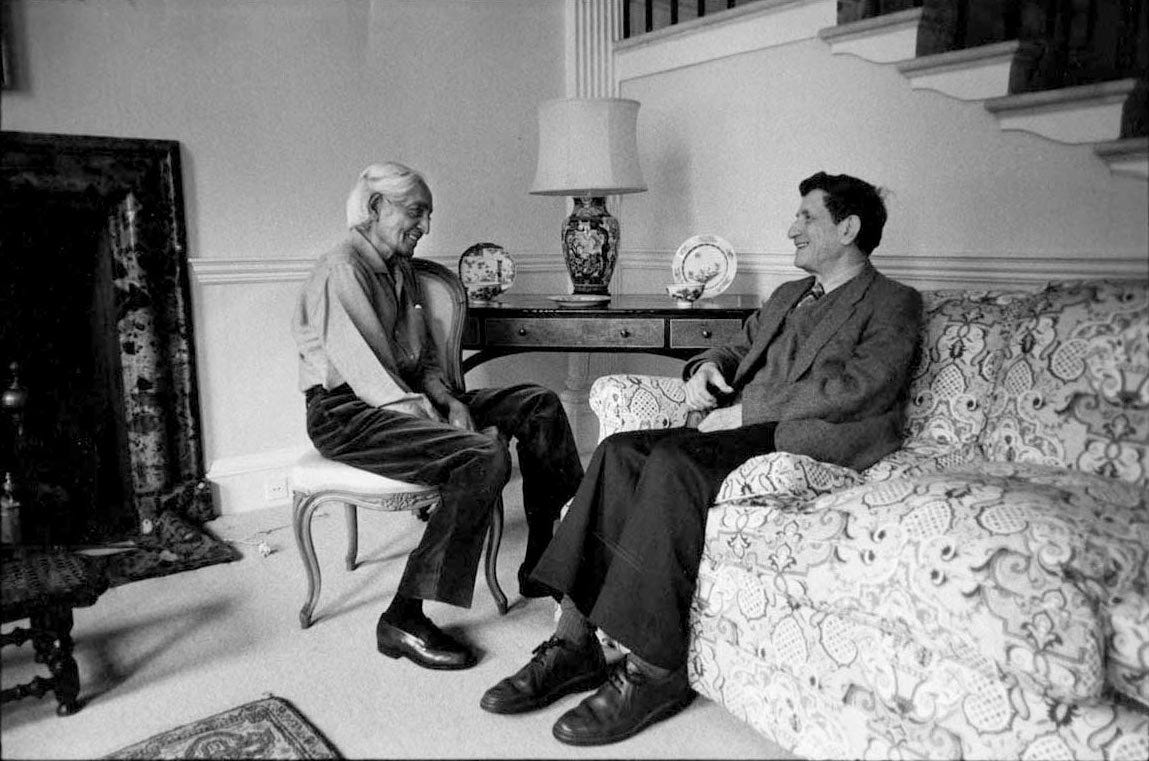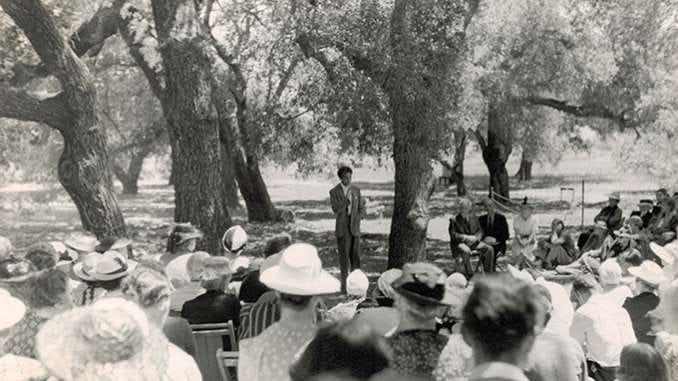“To free the mind from all conditioning, you must see the totality of it without thought.”
Welcome to a very special edition of the renamed “Students of Leadership,” and what better way to do it than to dedicate it to the great teacher and eternal student, a free thinker, Jiddu Krishnamurti.
Krishnamurti stands out as a unique and profound voice of the 20th century, one of the modern philosophers that helped us shape the view of our world. His life and teachings offer an invaluable collection of insights for leaders and contrarian thinkers of all kinds.
Krishnamurti was born on 11 May 1895 in Madanapalle, a small town in south India, and his early life was marked by simplicity. However, destiny had other plans. As a young boy, he was discovered by Charles Leadbeater of the Theosophical Society, who believed Krishnamurti was the new "World Teacher" they had been waiting for. This prediction set the stage for Krishnamurti's global journey, but in a twist of fate reflecting his true spirit as a free thinker, he would later disband the organization emphasizing the need for individual discovery without the confines of organized religion or groups.
One of the most memorable anecdotes from his conferences was his dialogue with a persistent attendee. The man insisted on asking, "How can I experience God?" Krishnamurti as the iconoclast he was responded, "Why do you want to experience God? Do you know what God is? If you knew, you would not ask. If you don't know, what are you going to experience?"
This exchange encapsulates Krishnamurti's approach:
Challenging assumptions and urging direct personal inquiry.
Jiddu Krishnamurti
The core of Krishnamurti's teaching is contained in the statement he made in 1929 when he said, 'Truth is a pathless land'. Man cannot come to it through any organization, through any creed, through any dogma, priest or ritual, not through any philosophical knowledge or psychological technique. He has to find it through the mirror of relationship, through the understanding of the contents of his own mind, through observation and not through intellectual analysis or introspective dissection.
His teachings were rooted in the understanding of the self. "To understand the immeasurable," he once said, "the mind must be extraordinarily quiet, still." For Krishnamurti, self-awareness was the key. Before one could understand the world or lead others, one had to understand oneself. This introspection, he believed, would lead to a transformation in the individual, which in turn would lead to a transformation in society.
For Krishnamurti being free meant freeing the conscience from all the conditioning in order to see and feel the world in its original purity again.
Leadership, in Krishnamurti's view, was about understanding, compassion, and most importantly, again, self-awareness. He often spoke of the importance of independent thought. "Authority of any kind," he warned, "especially in the field of thought and understanding, is the most destructive, evil thing. Leaders destroy the followers and followers destroy the leaders."
Krishnamurti's insights on education were particularly profound. He founded several schools around the world, emphasizing a holistic approach to education, not just focusing on academic learning but on understanding the whole human being. "Education is not merely acquiring knowledge, gathering and correlating facts; it is to see the significance of life as a whole," he remarked.
Throughout his life, Krishnamurti engaged in deep dialogues and profound inquiry with scientists, scholars, and leaders. One of his most famous series of conversations is the one he had with physicist David Bohm during the 80’s, delving deep into the nature of reality, thought, and consciousness, bridging the gap between science and spirituality.
Below an excerpt from a David Bohm’s newsletter on his encounters with Jiddu Krishnamurti, it’s worth reading to better understand Krishnamurti’s legacy
“My first acquaintance with Krishnamurti’s work was in 1959 when I read his book The First and Last Freedom. What particularly aroused my interest was his deep insight into the question of the observer and the observed. This question had long been close to the centre of my own work as a theoretical physicist who was primarily interested in the meaning of the quantum theory. In this theory, for the first time in the development of physics the notion that these two cannot be separated has been put forth as necessary for the understanding of the fundamental laws of matter in general. Because of this, as well as because the book contained many other deep insights, I felt it was urgent for me to talk with Krishnamurti directly and personally as soon as possible. And when I first met him on one of his visits to London, I was struck by the great ease of communication with him, which was made possible by the intense energy with which he listened and by the freedom from self-protective reservations and barriers with which he responded to what I had to say. As a person who works in science, I felt completely at home with this sort of response because it was in essence of the same quality as that which I had met in these contacts with other scientists with whom there had been a very close meeting of minds. And here I think especially of Einstein, who showed a similar intensity and absence of barrier in a number of discussions that took place between him and me. After this, I began to meet Krishnamurti regularly and to discuss with him whenever he came to London.
We began an association which has since then become closer as I became interested in the schools, which were set up through his initiative. In these discussions we went quite deeply into many questions which concerned me in my scientific work. We probed into the nature of space and time, and of the universal, both with regard to external nature and with regard to mind. But then we went on to consider the general disorder and confusion that pervades the consciousness of mankind. It is here that I encountered what I feel to be Krishnamurti’s major discovery. What he was seriously proposing is that all this disorder, which is the root cause of such widespread sorrow and misery, and which prevents human beings from properly working together, has its root in the fact that we are ignorant of the general nature of our own processes of thought. Or to put it differently, it may be said that we do not see what is actually happening when we are engaged in the activity of thinking. Through close attention to and observation of this activity of thought, Krishnamurti feels that he directly perceives that thought is a material process which is going on inside of the human being in the brain and nervous system as a whole.
Ordinarily, we tend to be aware mainly of the content of this thought rather than of how it actually takes place. One can illustrate this point by considering what happens when one is reading a book. Usually, one is attentive almost entirely to the meaning of what is being read. However, one can also be aware of the book itself, of its constitution as made up out of pages that can be turned, of the printed words and of the ink, of the fabric of the paper, etc. Similarly, we may be aware of the actual structure and function of the process of thought and not merely of its content.
How can such an awareness come about? Krishnamurti proposes that this requires what he calls meditation. Now the word meditation has been given a wide range of different and even contradictory meanings, many of them involving rather superficial kinds of mysticism. Krishnamurti has in mind a definite and clear notion when he uses this word. One can obtain a valuable indication of this meaning by considering the derivation of the word. (The roots of words, in conjunction with their present generally accepted meanings often yield surprising insight into their deeper meanings.) The English word meditation is based on the Latin root “med” which is, “to measure.” The present meaning of the word is “to reflect,” “to ponder” (i.e. to weigh or measure), and “to give close attention.” Similarly, the Sanskrit word for meditation, which is dhyana, is closely related to “dhyati”, meaning “to reflect.” So, at this rate, to meditate would be, “to ponder, to reflect, while giving close attention to what is actually going on as one does so.”
This is perhaps what Krishnamurti means by the beginning of meditation. That is to say, one gives close attention to all that is happening in conjunction with the actual activity of thought, which is the underlying source of the general disorder. One does this without choice, without criticism, without acceptance or rejection of what is going on. And all of this takes place along with reflections on the meaning of what one is learning about the activity of thought. (It is perhaps rather like reading a book in which the pages have been scrambled up, and being intensely aware of this disorder, rather than just “trying to make sense” of the confused content that arises when one just accepts the pages as they happen to come.)”
David Bohm
Jiddu Krishnamuti wrote a large number of books and gave countless hours of lectures. When I was living in California I had the opportunity to visit Ojai where he established, founded a school and the current foundation under his name is. If you are interested in having a better understanding of his work, I suggest you visit this link Krishnamurti Foundation of America
In closing, some Leadership Lessons I believe Krishnamurti's teachings offer
Self-awareness
Before leading others, learn to lead yourself and for that, first understand yourself. Recognize your biases, limitations, fear and strengths. Then encourage self-awareness in others and seek to understand before asking to be understood.
Question everything
Don't accept anything on mere faith or because it's the status quo. Ask better questions, connect the dots, triangulate, seek to understand how things work and why they are the way they are in the first place. True leadership requires critical thinking.
Empathy and compassion
Leadership is about understanding and caring for those you lead. Walk in your team’s shoes, feel their pain and struggles, be present for them and together be present for each other. Give care and demand respect for the values that bond the team together.
Holistic development
Recognize the importance of developing the whole of the team needs, not just knowledge and skills, but robust ways of working, solid processes, systems thinking, new ways of looking and old problems, well-being and human experiences that will build high performing teams that not just can deliver today but can sustain high-performance over time.
The danger of authority
Be wary of the pitfalls of power and the importance of mutual respect and understanding. I suggest you refresh your memory re-reading my recent post on the about the risks of ‘Hubris’
Final thoughts
In a world where dogma and division are dominant forces, Krishnamurti's call for self-awareness and free thought is more relevant than ever. His whole life serves as a testament to the power of introspection, dialogue, and the relentless pursuit of truth.
A person genuinely embracing his teachings will pave the way for a more compassionate, understanding, and holistic approach to building human relationships.
P.S. Before I go, here you have “The Treat,” where I share some of the music that kept me company while writing … Enjoy as you bid farewell to this post
“Lead yourself, Learn to live. Lead others, Learn to Build.”
If you enjoyed reading this post consider subscribing to the newsletter for free, joining the community and sharing your thoughts.








